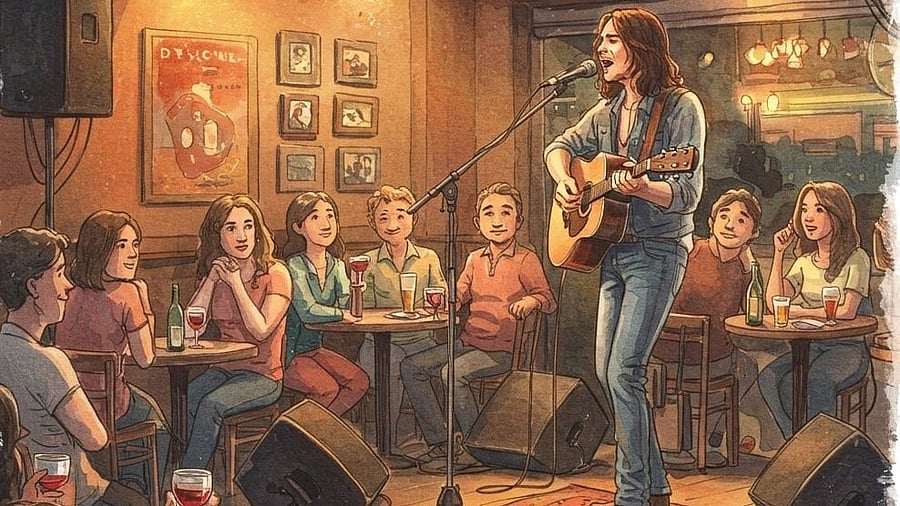
DJ Teri Miko and Debjyoti Das performing R&B specials at Somad Fest.
Photo credit: Special arrangement
Bengaluru is the “Pub Capital of India,” and its vibrant nightlife has fostered a growing rave culture. The gig economy thrives as several citizens shift from conventional careers to their passions.
Rhythm and Blues music (R&B) was a popular genre in the 1940s that emerged among African American communities. In India, the R&B genre has been reshaped into a fusion of groovy beats that is soulful to listeners.
Artists are slowly developing a liking for Western music genres, shaping their niches, and performing at renowned events such as the Echoes of Earth Festival, Sunburn Union, and SoMad Fest, which are organised nationwide. The audience has also learned to appreciate it.
Due to the rise of different platforms that allow live streaming, ticket booking, and marketing, R&B music enthusiasts have a wide reach and can participate. Clubs, restaurants, and hotels provide spaces for these artists to perform, simultaneously increasing their footfall.
Eashwar Nanda (30), founder of SoMad Fest and an artist, says, “Every event is a gamble. Staying culturally relevant is important.” Due to the number of events curated daily, choosing artists and venues has become difficult.
Most of the audience prefers to attend it via free guest-listed entries. “Organisers and artists need to understand and educate the audience on the importance of buying tickets and treating the space as a paid experience,” he explains.
A sustainable career path
In India, the gig economy has seen vast growth in various fields. People get hired for a short-term contract with an organisation. This has also been prevalent in the performance field, where artists are hired on a short-term basis and sometimes only for a specific day.
The shift from a conventional job to being a full-time artiste is more than just having skills. It is about building a unique identity, networking, and marketing business tactics. Social media platforms are crucial tools that help reach a larger audience and gain visibility. Artists add to their revenue by collaborating with brands and playing at music festivals.
Raka Ashok (35), a record producer and disco jockey (DJ), states, “The music industry is unpredictable with no clear structure, and success isn’t linear. It requires persistence, adaptability, and a strong mindset to navigate the ups and downs.” He stresses the necessity of having multiple income streams to sustain the journey.
Competition and financial stability are challenges that affect artists. As the techno music industry continues to grow in the city, there will be more opportunities for full-time careers in the music industry.
“One of the biggest challenges is payment timelines, with the standard wait time being 40 days. It can be frustrating when trying to manage finances as an independent artist”, says Raka.
Similarly, Amatchi (23), a freelance DJ, hustled a full-time public relations job, managing artistes and a DJ course. She says, “Many artistes have not received their payments for years. The industry can be improved with legal contracts for timely payments.”
Ultimately, it is more like the survival of the fittest. “A game of uncertainty,” she adds.
Digital media and art
Digital platforms give independent artists more power to build an identity. “While it is an opportunity to meet new people and network, using other social media platforms to build an image and share music can help break away from burnout and competition," says Amatchi.
As the rave culture evolves in the city, the rise of artistes and events portrays the change in societal perspectives and the growth of music culture. “Create unique content and unheard music to draw the attention of event organisers,” remarks Eashwar.
From passion to ambition
Once bound by society's shackles to pursue stable careers, artists now believe that following their passion for techno and house music brings them comfort. By breaking these stereotypes of society, young professionals today opt for more creative careers.
“It’s not actually a big shift,” says Dr Ali Khwaja, Counsellor and Chairman of Banjara Academy. Due to more awareness and courses offered by reputed institutions, students now know how to earn well in these professions.
“Most of the awareness comes from social media, but mainstream media is where they can get detailed and reliable inputs on how to build such careers,” he adds.
“Opportunities and awareness have increased in a field which was once called risky,” he explains. The increase in platforms to perform fuels the city’s nightlife’s gig economy and provides these artists a sustainable career.